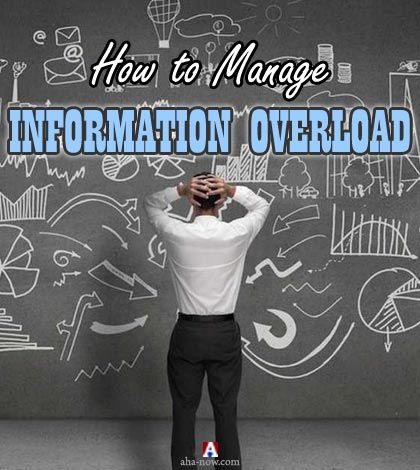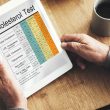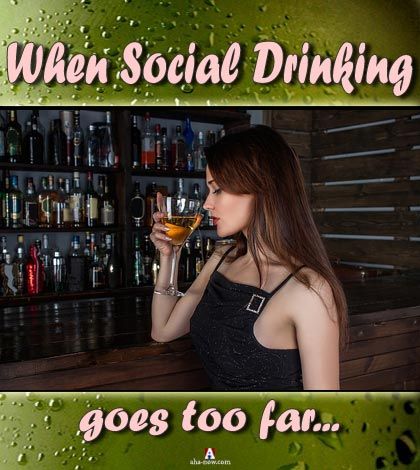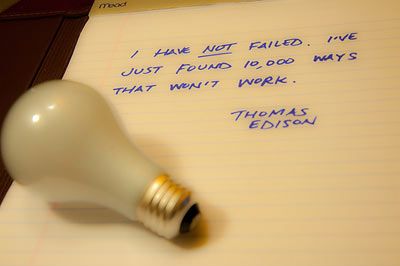How to Manage Information Overload Effectively for Better Living

Table of Contents
Hello, digital junkie! Excuse me? Lol…never mind.
A quick question for you: Can you last for one full hour without looking at some sort of a screen be it a mobile phone, tablet, TV, laptop or PC?
Very difficult, isn’t it?
We live in an age where we have become addicted to screens.
Most of us most of the time are digitally connected with one another regardless of our physical location, our age or our occupation. Every home is wired, and everyone is plugged-in breathing information day in and day out.
There are now over 1.2 billion people on Facebook. In the USA, people have an average of 250 Facebook friends – meaning a lot of messages to read when they update their timeline.
It’s not hard to imagine that you might just have sent a few WhatsApp messages to your contact list, updated your status on Facebook, read a few tweets and responded to other ones, or downloaded a free report or e-book after subscribing to some famous blogger’s newsletter, and read few e-mails and online blog posts before you actually started reading this paragraph. True or…true?
Welcome to the age of Information Overload!
These days we are bombarded with all sorts of information from all corners.
This simply drags us to the compulsive reading of a lot of information on a daily basis continuously.
And certainly, it affects how we live and function.
Let’s look at a few numbers
- In the USA, a person consumes 60 hours/week taking in web content, especially from social media.
- In 2008, Salary.com and UCLA conducted one survey and found out that on average workers waste up to 2.09 hours in one day online.
- Every second of the day, an average of 58 photos are posted on Instagram (source: b2c.com)
- Each day, a person receives a whopping 285 pieces of content (that is 44,000 words) (source b2c.com)
- 20 million e-mail or private messages are sent every 30 seconds (source: b2c.com)
How does this affect me? Well, observe people around you next time when you go to the park or gym or restaurant.
You’ll notice that a mobile phone has become an integral part of people’s lives. Now and then people feel this strange compulsion to pull out their device and start looking at their mobile screen.
Type any word into a search engine and there will be plenty of links for Google, YouTube, Quora, Wikipedia, blogs, and forums that throw tons of information on your screen for that subject.
The ocean of information only sinks you into a passive state of reading. You keep reading until you feel fatigue and get really tired.
Your information processing capacity simply declines, and it becomes difficult to arrive at any conclusion or to make any decision.
In fact, you have no time to put your learning into action to see any concrete result. Rather than adding value to your time investment, it only wastes your many precious hours.
Effects of Information Overload
Here are some ways in which the overload of information affects the quality of our life.
1. Decreased Attention Span
The technology giant Microsoft has conducted a consumer research to find out the human brain’s average attention span.
They discovered that our attention span is now decreased from 12 seconds (in 2000) to 8 seconds (in 2013), which is even less than a Goldfish. A Goldfish has its 9 seconds.
Herbert Simon has rightly said that “A wealth of information creates poverty of attention.”
Alright, you might be thinking how does this matter to me? Well, think for a moment, what can happen to your resume that you sent out for your dream job when the recruiter has thousands of resume to scan through!
You only have less than 8 seconds to make it or break it.
2. Being a Victim of Analysis Paralysis
If you’re diving into an ocean of information with a view to acquiring more knowledge on a specific subject, you simply will sink in and never surface.
There are so many different views, options, and explanations found on any given subject that it will cause researchitis in your brain.
You will be tempted to dig deeper. This only takes up more time than required from your busy day. Too many options simply weaken your commitment to move forward.
3. Poor Decision-Making
An overloaded brain is prone to make wrong choices just to regret them later.
Daniel Kahneman explains in his book “Thinking Fast and Slow” that while we would love to think that our decisions are rational, the majority of them are based on intuition or gut feeling.
The problem we face now is that we simply have to make a lot of decisions because we have a lot of choices to select from for any given problem. This is truly exhausting and leads us to decision fatigue after some time.
Decision fatigue affects judges, graders, and anyone whose job involves continuous judgement
4. Information Obesity
Today for every single question whether it be related to health, wealth, relationship or as simple as the question of how to make an Indian curry…you simply ask Google Guru and Dr. YouTube.
Note that not all the information posted on the internet is from authentic sources. They contribute to your enhancement, enlightenment, and confusion equally.
To avoid a fat brain, we have to choose the diet we select for our brain mindfully; otherwise, we will just consume lots of extra empty calories at the Fast Food restaurant called the Internet.
The way we choose our diet mindfully to avoid obesity, we must practice mindfulness when it comes to consume information.
5. Health Issues
“Plugged in” compulsion and the urge of “staying in touch” has given birth to many health issues such as stress, hurry sickness, strained eyes, fatigue, and also now tech neck (result of constantly bending our neck to look into our mobile screen.)
Obviously, our physical movement has been reduced drastically resulting in sudden weight gain and related diseases.
6. Development of Wrong and Damaging Belief System
I am sure you must have read this sales page where the title reads: Find Your Passion, Work From Home, or Ditch Your job and Travel Anywhere You Want.
Many so called successful bloggers employ their impressive copywriting skills to write a sales page or a blog post to promote their information products.
This mass information movement is so delusive that it persuades you to buy into wrong notions regarding success. No wonder it results in confusion, failure, and frustration.
There is no short cut to success and no substitution for hard work.
How to Overcome and Manage Information Overload
Content consumption is a highly personal choice; however, one should know when it affects your quality of life.
Mindfulness and commitment are two elements with which you can overcome information overload.
1. Clarity of Purpose
Technology is there to serve us. We should use it to enhance our quality of life.
Limit your usage and use only as much as you really need. Whenever you go online, or read something online ask yourself: “What’s my purpose for doing this? And how effectively can I complete this in the least amount of time?”
This awareness alone will help you to bring your focus back to the purpose.
2. Focus on Single Tasking
Interrupting one task with another may be necessary sometimes and also it is fun. However, it definitely slows us down.
The important task should be completed with single-mindedness and undivided attention. It’s not only worth it but most rewarding also.
That being said, we also must know the difference between things that can be clubbed together (e.g. watching TV while you are on the treadmill) and the things that cannot be multitasked (e.g. reading a book when you’re cooking).
Multitasking simply cannot be practiced everywhere.
3. Appreciate Nature
When did you last stare at our magnificent sky for a long time?
Take some time out from constantly staring at screens, and instead, look up and watch the sky for five minutes every day.
Dark, starry, pouring, shining, sunny or cloudy—whatever the color of the sky, the magnanimity of it will simply calm you down. Spending time with nature brings us back to our life source.
I would like to share this beautiful poem titled Leisure by William Henry Davis that my English teacher taught me in my early schooldays.
Leisure
What is this life if, full of care,
We have no time to stand and stare.
No time to stand beneath the boughs
And stare as long as sheep or cows.
No time to see, when woods we pass,
Where squirrels hide their nuts in grass.
No time to see, in broad daylight,
Streams full of stars, like skies at night.
No time to turn at Beauty’s glance,
And watch her feet, how they can dance.
No time to wait till her mouth can
Enrich that smile her eyes began.
A poor life this if, full of care,
We have no time to stand and stare.
4. Work in a Distraction Free Environment
Work in small sprints with frequent breaks, and while doing so, make sure that your environment is distraction free.
Ask your family, friend, or colleague to help you remain focused. They can watch out for any external disturbance when you are working for 60 minutes with full focus.
They will help, and you will notice a difference in how much faster you accomplish your tasks.
5. Nurture Your Relationship with Attention and Care
With growing TV channels and smart phone access, family members are getting disconnected from each other despite sharing the same shelter and food.
Even in a park or restaurant, it feels like we are more close to our device than our friend or family member standing right next to us.
Put your phone aside and look into the eyes of the other person when they talk. Reciprocate with love and care.
Every day I go for a walk in my neighbourhood with my wife and our three-and-a-half-year-old daughter. I made a simple rule; we won’t take our phone with us when we go for a walk.
What fun talking and laughing together! Try it, go out with your family or friend without your phone, and notice the positive difference.
When you are with your friends or family, put your phone aside to connect with them. And when you are alone, pull out your phone and use it to connect with your friends and family – that’s actually the purpose of the device.
6. Limit Your Time with Electronics
Have you noticed that staying in close proximity to electronics devices for a long period actually drains you out, and you feel tired and heavy?
At work, take frequent breaks, wash your eyes with cool water, do some deep breathing, stretches, or stand up and go for a brisk walk or climb staircases.
This will help your blood rotation, and you will feel energetic.
7. Unsubscribe – Unfollow
There are many experts and many wonderful blogs in the same niche. However, limit yourself to one or two.
Feel free to unsubscribe or unfollow all that you are not able to read regularly.
Follow one expert for some time. Read his/her work for at least six months and give yourself time to implement your learning.
8. Be an Action Warrior
Let’s not forget that real results come from actual actions, not from thinking, dreaming or planning.
It’s okay to have one or two goals. Write down your why – your purpose statement for that goal, and read it twice a day to remain focused and clear on your objective.
Devote the rest of your day taking actions for the achievement of the same goal.
Wrapping Up
Remember, reading ten books on meditation is convenient, but actually sitting and doing meditation for 10 minutes every day is a different ball game and will actually take less time and help you more.
A thoughtful proverb in Sanskrit says: ज्ञानम् भारम् क्रिया विना? – Meaning, the knowledge which is not in action, is simply a burden. You only can do so much after knowing something. Drop the burden and start living.
Stop spending your whole life in preparing to live, start living now. Unplug yourself and start living. Turn off the internet, switch off your phone. Breathe. Smile. Talk. Feel.
Over to You –
How about you? How do you stay focused, make right decisions, and live a balanced and productive life while dealing with the information overload in your day to day life?
Disclaimer: Though the views expressed are of the author’s own, this article has been checked for its authenticity of information and resource links provided for a better and deeper understanding of the subject matter. However, you're suggested to make your diligent research and consult subject experts to decide what is best for you. If you spot any factual errors, spelling, or grammatical mistakes in the article, please report at [email protected]. Thanks.











I guess I certainly agree with the listed points regarding information overload. I have been a person who used to read lot of articles on the same subject and hence I was very much confused on what to follow. And hence that resulted in zero accomplishment.
You did a wonderful job by sharing this amazing post.
Thanks
Hey Vinod,
Appreciate your taking time out to read my article and comment on it. I am glad that you found it helpful.
Good luck 🙂
Hello ma, this is cool post about information overload. its never easy as a new blog – most cases if you want to skyrocket your understanding about s given niche, you need to read tons of articles and that leads to information overload.
All the same, thanks for you tips
Hello Bharat Jhala,
Well I’m new here and landed here from some blog where harleena has commenting on a post.
I must say you are absolutely right about the information overload and its disadvantages. I read lot of articles and books and sometimes I feel like I’m forgetting most of the things I read recently. These tips are of great help.
Thanks for sharing.
Nice writeup Bharat on information overload management. Sometime possibilities came immediately to mind, people make poor decisions when under severe time pressure or when they don’t have access to all the important information; unless they are explaining the decision to their boss, and then it is often someone else’s fault. I always prefer to take some break at this pressed situation and it really gives me positive vibe to work again energetically.
Thanks Atul, I’m glad that this subject gets attention of everyone, as it affects everyone. We also need to come up with action plan after contemplation.
Thanks for your thoughtful comment, Atul.
Good luck 🙂
Bharat,
This is such an important post. I agree with others, it is especially disturbing for children to be given devices at such young ages. Research has shown that this impairs their Executive Function and causes that part of the brain which governs EF to remain un or underdeveloped. Parent’s don’t realize that when they hand their child a device.
Executive Function develops between the ages of birth and 5 years old and once that part of the brain remains undeveloped, it is difficult if not impossible for that brain center to develop after the age of 5.
I see many people in my therapy practice who are having device addiction problems but can’t admit it or curtail their use. You provide helpful suggestions for that!
Spread the word!
Wow Kim, that’s something interesting. You should write on that subject.
Thanks for dropping by and your comment.
Hey Bharat and Harleena,
We all should take heed to Bharat’s advice. Last year I was reading blog posts just about everyday on my mobile phone and as a result my eyes started straining from it. I had to take a break to get my eye self and myself back to focus. Especially with information overload.
Thanks for sharing! Have a great week!
Hi Shermon,
Glad that this post helped to reinforced your learning.
Take care
Hello Bharat, Excellent article about a problem many of us have! I dropped my phone in the ocean recently (not recommended) and had to go without it for 24 hours. That was much harder than I thought! I didn’t think I was dependent on my phone until then.
I love your quote by Herbert Simon that “A wealth of information creates poverty of attention.” You’re right, we have all of the information in the world at our fingertips, but that truly can be overload.
Your suggestions for how to tackle this problem are spot on. I have started unsubscribing to the information I don’t need. But I definitely will keep my subscription to this site!
Wow! you are so daring person, Carolyn,
Sometime, if you just want to quit on something, you just follow the Nike way — Just Do IT!
Thanks for reading this article and your comment.
P.S.: I loved your website and the niche you selected to contribute. Keep going 🙂
Hi Bhrat,
Today’s technology world can suck us up into a void of knowledge. It can be information overload if we let it into our lives.
We have to be human first and use technology wisely. Leave your phone home when with your children at the playground, taking a walk with your other half, and so on. Never answer that phone in a restaurant.
We can come online as bloggers and marketers and spend the entire day sitting. That will only ruin our health. We have to enjoy our life, and get into our own body mind/body/spiritually every day.
Nothing wrong with technology as long as we don’t depend on it.
-Donna
So well said, Donna.
” Nothing wrong with technology as long as we don’t depend on it.” – Loved it.
We all need technology and it’s a wonderful addition to human life, as long as we don’t depend on it…
Thank you 🙂
I would say health issue is the biggest concern of overdose of information with these days of kids. They are just dragging too much on technology and end of with frustration. Thanks for this awesome share.
Hi Bharat and everyone. I’m pasting below some information about the book which I’m currently reading.
Full catastrophe living: using the wisdom of your body and mind to face stress, pain, and illness
Kabat-Zinn, Jon University of Massachusetts Medical Center/Worcester Stress Reduction Clinic.
Subjects: Psychology and Self-Help
Description: Founding director of the Stress Reduction Clinic at the University of Massachusetts Medical Center describes the philosophy of mindfulness meditation developed there and the ways he believes it can improve physical and mental health. 1990.
“The program of the Stress Reduction Clinic at the University of Massachusetts Medical Center.”
Digital talking book. 4 levels. Digitally mastered.
ISBN: 9780385303125, Recorded from:, New York, N.Y. : Delta Trade Paperbacks, 2009, c1990.
I’m currently taking a yoga class and really enjoy it.
Thanks Jacob for the book titles…I will definitely read them..I love reading in fact.
Yes, yoga and meditation is universal and very beneficial to humanity. I started doing my meditation and yoga (courtesy to Art of Living)…at very early age, and now it has become an integral part of my routine…loving it by all means.
Thank you Bharat and Harleena for such a well-rounded article. I don’t have to worry that much about turning off my iPhone, because I don’t even own one. However, I am on my computer a lot both for work and play. I’m a screen reader user so don’t have to worry about neck strain, but I completely agree with you about taking breaks. As a matter of fact, I’m writing this comment while sitting on my back porch enjoying the nice, cool evening. I love nature, and I very frequently hang out with one or more neighbors and tutors outside. I’m also an avid reader, and I am currently reading a book about mindfulness that was recommended to me by a neighbor. I’m going to read at least one more of this author’s books, because I like what he says. Those who wish to know the titles of these books, please comment here or message me privately. I’m listening to audio versions of them, and the site from which I downloaded the current one requires logging in and I don’t want to give out that information on here. I’m not a very good independent traveler, but I do get out a bit on my own.
Hi Jacob,
Thanks for taking out time to write this comment. Me and my wife both are giving it a lot of thought to live a phone-free life (this is just a personal belief, that phone is not a necessity, we made it so…we can be just fine without it.)…however, we still own a phone…may be one day.
And mindfulness, is a very good quality, and would really appreciate if you can share the title of the book you are reading. Why not here, for the benefit of many?
I read “The Power of Now” – By Eckharat Tole, i found it very profound.
Thanks
I really like your suggestion to give yourself an hour without digital distractions. In addition to that, maybe make actual face-to-face contact with someone! I fear young people are losing basic social skills because of fewer human to human connections. Too much digital exposure is definitely related to health issues, as you mentioned. Great article. Thanks.
Thanks Donna for your comment and concern for the young people. But responsibility begins with the dream, as they say, we must not get disheartened with the fact of how information overload affects quality of relationships, and to young kids in general.
We should let them know what is right and demonstrate by actions and living what we think is right. That’s why I started practising going for a walk without my favourite gadget – mobile 🙂
Cheers!
Hi Bharat
It is so awesome to have you on Harleena’s blog and your insight on Information overload is just grand. You know what the internet has done is to expand our social network and increase our ability to socialize in warp speed.
No one is bound by time and space. You can socialize with anyone . This also means that we can find out about so many things. Unfortunately, too much of everything is not cool and trying to keep up with so much information is what has lead to our present overload.
Thanks for sharing ways to overcome this issue as your ideas are spot on. Thanks for sharing. Take Care
Hey Ikechi, how’re you my friend?
I am glad that you found my post helpful.
Cheers
The internet is the easiest place to receive overloaded information and being with overloaded information can be so counterproductive and keeps us going the circle.
Exactly, Louis 🙂
I’d like to add an extra tip to prevent information overload is to know what they’re aiming at. An example if they’re learning about how to moon walk. It’s great to have a bunch of information on that 1 topic instead. And it’s still fine when they have overload information on 1 topic rather than 10 topics.
Hey Bharat,
Glad to read your wonderful post,
Great analytic, i may sure this comes with several studies and researches. To make more money through online business we have to really spent more time on computer screen.
At last, you have drop great proverb knowledge which are in not action, they are simply burden.
Eventually, thanks for sharing your worthy post.
With best regards,
Amar kumar
Thanks Amar for your time to read the post and for your comment.
Yes, agreed these days we have to spend more time on computer screen. My point is not to stay away from it. In stead, my focus is not to get driven away with all the irrelevant distractions, practising mindfulness to remain focus on what’s important for us.
Thanks and good luck, buddy 🙂
Hey Bharat,
In this digital era, people are dwelling into the smartphones’ world. You are right, if you go to any park or anywhere, you would see the people using their phones.
Facebook has the major role to boost up the mobile usage. People just try to be more social but they forget about the health issues they can face.
I am glad that you brought this up. People need to know about the negative and positive effects.
Thanks for sharing with us.
Have a great day.
~Ravi
Hello Ravi,
I’m glad that you found this article useful.
You have a great day too buddy 🙂
Omg, being overwhelmed with information can be so counterproductive. Especially when you intend to find something out to take action on and then it just becomes too much.
I used to suffer from this badly. Now I just try to focus on the immediate task and what needs to be done next. When I do think ahead it’s only for clarity, as you said. Being sure not to overwhelm myself.
~Lea
Hi Lea,
You’re right one of the disadvantage of information overload is distraction when you are trying to take actions on important goal.
Glad that you have better control over it and remain focused on important things.
Good luck, Lea 🙂
You’ve addressed a fairly new (growing over the last 10 years) phenomena in a timely fashion. This addiction to information can be hard on people and we need to heed advice like yours to stay healthy. Thanks for this well-thought-out article.
Hi Kate, how’re you? thanks for dropping by and your comment.
You know what, actually “Information overload” term is used first by a futurologist Alvin Toffler in 1970, when he predicted that the rapidly increasing amounts of information being produced would eventually cause people problems. At that time information was still largely limited to printing press.
But you’re right, now this information blast is more apparent than ever before, and everybody is a victim of it.
Mindfulness and focus is the only key to survive.
Thanks Kate, for your time and comment..have yourself an awesome day 🙂
hello Bharat, and welcome to Harleena’s blog.
You have shared with us some wonderful tips on how to stay sharp and not to overload our brains 🙂
You asked a question earlier on, my answer is; i do stay many at time not touching my phone or tv and my laptops for more than an hour 🙂
Thanks for dropping such a wonderful post… Have a great week both of you..
Hello Babanature,
I am glad you liked my article 🙂
Your mindful practice of staying away from screens is a very good thing. Keep it up!
Thanks
Hi Bharat,
This is a nice topic that almost all of us digital marketers (even normal people) deal with in common.
Limiting my time with electronics is what I have done after coming across Arianna Huffington’s Thrive book. I rarely am up with gadgets when I go to sleep. This tip of yours is sure to help other readers too.
Unsubscribe or unfollow is a must because we simply tend to follow many blogs, sometimes because we liked a few of their content or sometimes due to content upgrades. unfollowing or simply updating the email to a secondary id would be a great solution to decide if we need to cut through the subscription.
Thanks for the post.
-Swadhin
Hello Swadhin,
Agreed. Unfollow or unsubscribe is what I find very helpful to remain focused on what I want to do, and what actually adds value to my time and effort.
Arianna’s work is amazing…she stepped down from huffington post and will now focus on Thrive Global…I am looking forward to that as well.
Great meeting you on Aha-Now. Good luck 🙂
Hi Bharat and Harlena,
I enjoyed reading that! Being in the health field I had to laugh at the point about Information Obesity! Very true though.
I have to admit I am a bit of a digital junkie and spend more hours than I should in front of my computer screen but when you are trying to make money with an online business you do have to spend more time at a computer. I do have to be careful not to get distracted when I am say researching for a blog post and neglect the task at hand.
I do have to be disciplined and finish the day’s essential items on my to do list before I then reward myself by devouring some other things I’ve ear marked to look at. I do restrict myself to looking at Facebook just twice a day. I rarely eat meals at the computer although I know many people do. I think it’s important as you say to take frequent breaks and to get outside and focus on nature.
Thanks Sandy for your time to read and comment on my post. Actually, I do agree with you if you are making career online, you have no option but to spend more time in front of computer screen. I am also in the same boat 🙂
In that case, we have to be mindful, when we get distracted and our whole attention and time is diverted into other stuff which may sound meaningful but not helping to remain focused what is important for us to do.
Mindfulness is the key.
Thank you, again 🙂
Thanks Harleena for posting my article on Aha-Now. I hope the amazing readers find it informative, useful and value adding.
Thank you so much 🙂